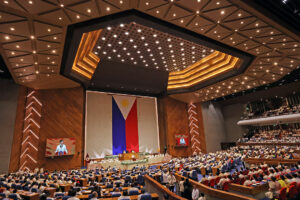THE Development Budget Coordination Committee (DBCC) will brief lawmakers on the Philippines’ economic outlook today, as Congress begins deliberations on the proposed P6.793-trillion national budget for next year, House Speaker Ferdinand Martin G. Romualdez said on Sunday.
He said Budget Secretary Amenah F. Pangandaman, Finance Secretary Ralph G. Recto, Socioeconomic Planning Secretary Arsenio M. Balisacan and Central Bank Governor Eli M. Remolona, Jr. would present the country’s macroeconomic assumptions for the 2026 budget at the House of Representatives, where they are also expected to respond to congressmen’s queries.
The 2026 National Expenditure Program, submitted to Congress last week by the Budget department, saw double-digit budget hikes for the Education, Health and Transportation departments, with funding slashes to the Public Works department.
Next year’s budget is equivalent to 22% of the country’s gross domestic product and is 7.4% higher than the P6.326-trillion national budget this year.
Mr. Romualdez said the House would adhere to the commitments it made to make the budget process more transparent, like inviting civil society groups to join the hearings and abolishing the “small committee” that has traditionally consolidated proposed amendments to the spending plan after plenary debates.
“If we’re talking about the people’s money, then the people should also know about it and benefit from it,” he said in Filipino. “We will not hide anything from them.”
The lower chamber would also focus on prioritizing allocating funds for food security, infrastructure and education, he added.
Lawmakers would also strengthen their oversight over government agencies once President Ferdinand R. Marcos, Jr. signs the budget bill into law, requiring authorities to submit reports timely and provide real-time updates on major projects.
In a separate statement, House Deputy Minority Leader and Party-list Rep. Antonio L. Tinio said next year’s proposed budget fails to address the “fundamental causes” of poverty and inequality in the country.
“There is no funding or program for national industrialization,” he said in Filipino. “We cannot achieve genuine progress without developing our domestic manufacturing industry. That’s what will create long-term jobs.”
The proposed 18.7% hike in the Education department’s 2026 budget to P928.5 billion falls short of solving the persistent lack of classrooms in government schools, he added, taking note that the government plans on adding only 4,869 new classrooms next year. “Why is the construction target so low?”
Congressmen have nearly two months to scrutinize and approve the budget bill before submitting it to the Senate, with Nueva Ecija Rep. Mikaela Angela B. Suansing, who heads the House appropriations committee, earlier saying the chamber is keen on a thorough review. — Kenneth Christiane L. Basilio

